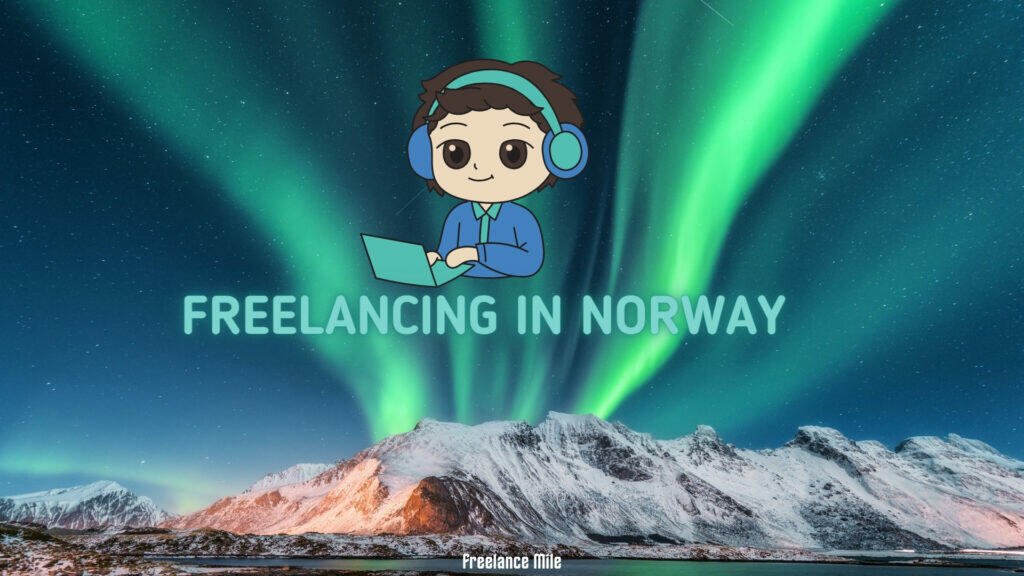As the world tilts towards greater work flexibility, According to plane.com, as of Feb 2024, the median annual salary for a remote freelancer in Norway is $57,400, spotlighting Norway as a burgeoning hub in the global gig economy.
With remote work becoming the norm, Norway has become a sanctuary for independent contractors and digital nomads in pursuit of a freelance visa or work permit. Here, I’ve found more than just a place to visit; I’ve discovered a unique fusion of professional autonomy and life-enriching experiences.
My journey has shown me that freelancing in Norway is much more than an escape from the conventional nine-to-five—it’s a thriving ecosystem teeming with opportunities across technology, design, and beyond. Delving into this freelancer’s haven, one finds a versatile path to success, paved with stunning landscapes and buoyed by a robust, welcoming economy.
Key Takeaways:
- Norway’s gig economy is part of a global trend that is reshaping the opportunity landscape for freelancers.
- Freelancing in Norway offers the prospect of remote work with a scenic backdrop, blending professional growth with an enviable lifestyle.
- The demand for skilled independent contractors in Norway underscores the vast potential for technology, marketing, and design experts.
- Navigating the requirements for a freelance visa or work permit is a crucial step for aspiring freelancers in Norway.
- Norway’s labor laws and work environment support a prosperous and balanced freelance career.
- As someone who’s immersed in Norway’s freelance culture, I affirm the opportunities and freedom it presents for like-minded professionals.
The Norwegian Freelance Landscape: Exploring the Gig Economy
As I delve into the realm of freelancing in Norway, it’s clear to see the nation’s gig economy reflects a growing preference for independent work. There’s a sense of freedom here, fostered by enlightened working environment acts and supportive business practices, encouraging more individuals to explore the possibilities of freelance work. The trend is not just about making an income; it’s about reshaping the very foundation of ‘work’ as it was once understood.
Understanding Norway’s Gig Work Popularity
Norway’s dramatic landscapes are an awe-inspiring backdrop for freelancers who are drawn to the flexibility and scalability that freelance work presents. The growth of the gig economy here isn’t accidental; it’s been bolstered by a society that values work-life balance and embraces technological advancements, making it an attractive locale for independent contractors worldwide.
Benefits of the Norwegian Gig Economy for Freelancers
In Norway, freelancers find themselves in a highly advantageous position. Whether operating as sole proprietors or forging partnerships, they have the opportunity to enjoy a well-regulated working environment. Emphasizing fairness and balance, Norway’s laws ensure that those who choose to freelance do so in a setting that is as respectful of personal welfare as it is of professional growth.
Freelancing in Norway: Legal and Financial Considerations
As I delve into freelancing in Norway, it’s become clear to me that the vibrant opportunities for freelancers extend far beyond their immediate specialized skills. Whether crafting social media strategies, translating Norwegian documents, or coding in PHP, every freelance endeavor comes with its own set of legal and financial considerations. Comprehending and adhering to the Norwegian Tax Administration’s directives is not just about due diligence; it’s essential for the vitality and longevity of your freelance business.
Given my experience interacting with fellow freelancers—from PHP developers and web developers to graphic designers and Android developers—I’ve noted the importance of understanding the essence of contracts under Norway’s auspices. Though the roles may differ, the imperative to manage fiscal responsibilities remains constant. Here’s a breakdown to help guide my fellow independents:
| Freelance Role | Primary Legal Concern | Typical Tax Obligation |
| Norwegian Translators | Contractual Clarity on Intellectual Property | VAT Registration for services exceeding NOK 50,000 |
| Android Developer | Licensing Agreements for Software Distribution | Advance Tax Payments for projected income |
| Graphic Designer | Compliance with Advertising and Marketing Laws | Business Income Taxation based on earnings |
| PHP/Web Developer | Data Protection and Privacy according to GDPR | Self-assessment tax returns with possible deductions |
Kindly consult with tax and legal professionals to ensure the accuracy of the information provided in this table, as tax and legal regulations are subject to updates and changes.
Remember, these engagements aren’t just about displaying your talent or growing a network; they inherently involve governmental considerations that can have a substantial impact on your entrepreneurial growth. Keep an eye on guidelines from the Norwegian Tax Administration, as they will help you navigate your financial voyage successfully while you expand your horizon on projects and clients.
Moreover, I’ve found that connecting with a network of seasoned freelancers and professionals can be an invaluable resource. They often shed light on the latest updates in tax legislation or marketing laws that could affect various aspects of your freelance business.
By staying informed, I not only abide by the government’s requirements but can also strategize for future fiscal stability. My experience suggests that the blending of professional expertise with legal and financial awareness is the bedrock of a flourishing freelance career in Norway’s dynamic market.
Navigating Freelance Opportunities in Norway

Norway’s burgeoning gig economy, bolstered with opportunities in tech and digital sectors, is an inviting scene for adept freelancers around the world. As I’ve navigated through this diverse marketplace, the prerequisite for success is a blend of cutting-edge skills and a robust network, primed for the ever-evolving demands of the industry.
The Demand for Digital and Tech Skills in the Norwegian Market
My journey in the Norwegian market reveals a high demand for digital expertise. Fields like data science, content marketing, and web design are particularly lucrative, with businesses keen to engage contractors who can navigate the complexities of the digital landscape. The surge in remote work options has opened doors for freelancers far and wide, providing a playground for those ready to take on the challenge and reap the rewards.
Connecting with Norwegian Clients: Strategies for Success
Building a sustainable freelancing career in Norway requires more than just skill—it necessitates a strategic approach to connecting with potential clients. As a freelancer, I’ve discovered the potency of establishing a strong online presence, leveraging my expertise as a content marketer & social media manager to engage with the target market. Utilizing a robust marketing strategy and networking with industry peers have been pivotal in ensuring a steady flow of projects.
- Championing remote work has allowed me to collaborate internationally, expanding my reach.
- Engaging in content marketing showcases my ability to drive brand awareness and generate leads.
- Applying data science to inform marketing strategy paves the way for targeted and effective outreach.
There are several freelancing platforms available that connect businesses with freelancers, offering a broad range of services. Upwork is a global platform that is widely used in Norway, while Altinn is a national platform for registering as a freelancer. Workana and Truelancer are also popular platforms that list freelance jobs in Norway. Freelancers in Norway can also register as sole proprietorships through Altinn and manage their taxes by paying quarterly. These platforms provide opportunities for both Norwegian and international freelancers to showcase their skills and connect with clients.
Freelancers like myself are carving out their niche as project managers, ensuring that work from Norwegian clients is executed with precision. The role of the freelance journalist is also evolving, with more emphasis on delivering stories that resonate in the digital world. Whether you’re a freelance project manager, social media savant, or creative web designer, mastering these areas is key to success.
| Specialization | Skills Demand | Opportunities in Norway | My Strategy |
| Data Science | High | Analytics and interpretation for business insights | Continual learning and application of latest trends |
| Content Marketing | High | Strategy and content creation for diverse platforms | Developing captivating content to engage audiences |
| Web Design | High | Creating responsive and user-friendly websites | Focusing on UX/UI to produce high-quality designs |
Norway’s gig economy offers a fertile ground for freelancers—where passion meets expertise. As a determined freelancer, my strategy is to stay ahead of the curve, continually refining my skills and marketing my services, ensuring that I am the contractor of choice for those seeking digital and tech expertise. It’s an exhilarating time to be freelancing in Norway, and I am here for the ride.
Building Your Freelance Business: Marketing and Growth Strategies
In my extensive journey through the freelance marketplace in Norway, I have discovered that the confluence of honed expertise and strategic marketing is the core driver of a flourishing freelance enterprise. Norway’s job market presents an eclectic array of opportunities, from customer service jobs to the more creative spheres of graphic design jobs and CAD designers. An essential strategy for success lies in the adept use of social media to bolster one’s online presence, enabling freelancers to connect with a vast client network that extends well beyond the Norwegian border.
As a freelance writer, my narratives serve as a magnet for readership and clients alike, and for a digital marketer, the formulation and execution of incisive campaigns through these platforms are imperative. Such endeavours ensure that we, as freelancers, are not just seen but also sought after for our distinctive services ranging from creative graphic design jobs to detail-oriented web development projects.
Embarking on a path to grow one’s business entails vigilance in identifying and seizing the manifold freelance jobs that arise in dynamic domains like interior design jobs and web development. The landscape is ever-changing, and thus demands our adaptability; it necessitates that we leverage and pivot our competencies to align with the evolving needs of the market, ensuring both sustainability and potential scale-up of our freelance endeavors.
| Job Category | Skills Required | Strategies for Growth |
| Graphic Design | Creativity, Adobe Suite Proficiency, Branding | Building a robust portfolio, Networking on Design Platforms |
| Web Development | Frontend & Backend Technologies, SEO, User Experience | Continuous Learning, Contributing to Open Source Projects |
| Freelance Writing | Storytelling, SEO Writing, Research Skills | Guest Blogging, Social Media Presence, Online Workshops |
| Digital Marketing | Data Analysis, Social Media Advertising, Email Marketing | Certifications, Use of Analytic Tools, A/B Testing Campaigns |
| Interior Design | Design Software, Spatial Awareness, Trend Insight | Virtual Portfolio, Collaborations, Attending Trade Shows |
| CAD Design | 3D Modeling, Engineering Principles, Detail Oriented | Online Courses, Industry Certification, Freelance Marketplaces |
I’ve learned that in our pursuit as freelancers, it is not just the quality of work that elevates us, but also our ability to navigate and harness the power of marketing channels to illuminate our invaluable offerings to the industry.
Conclusion: Positioning for Success in Norway’s Dynamic Gig Economy
As I reflect on the myriad opportunities presented by the dynamic gig economy in Norway, I see a terrain ripe with potential for those who are ready to adapt and grow. In every remote corner where the aurora dances, freelancers can carve out their niche, whether they’re crafting compelling user experiences as a UX designer or illuminating the professional prowess of others as a resume writer. For me, thriving in this landscape has meant embracing the journey of continuous learning and staying agile in a sea of change.
Cultivating a Sustainable Freelance Career in Norway
My voyage in cultivating a sustainable freelance career in this Nordic nation goes beyond securing the necessary freelance visa or independent contractor visa. It is about fostering excellence in every project, whether that involves data entry jobs that require a meticulous eye or mobile app development that merges creativity with technical skill. Each task is a step towards building a robust portfolio that amplifies my reputation and secures my place within the gig economy’s pulsating heart.
Future Trends: The Evolving Landscape of Freelancing in Norway
Looking forward, I anticipate further transformation as Norway’s business enterprises reshape their demands in the wake of digital transformation. To stay ahead, I find it essential to align with emerging trends, polish my skills as market needs evolve, and remain alert to the nuances of work permit regulations that can influence my journey. For us freelancers, the future holds promise and challenge in equal measure, and I am poised to meet both with the same spirited determination that has brought me to where I stand today.
FAQ
How can you move to Norway as a freelance writer?
To move to Norway as a freelance writer, you can register as a self-employed person if you are an EU/EEA national and plan to engage in long term business activities in Norway. You must also meet certain requirements and can bring your family to Norway.
What are the freelance negotiation tactics in Norway?
Freelance negotiation tactics in Norway involve understanding the art of negotiation, including doing research, understanding your value, setting clear boundaries, listening carefully, being flexible, and maintaining a professional demeanor
What are the popular freelancing platforms in Norway?
Some popular freelancing platforms in Norway include Upwork and Truelancer




